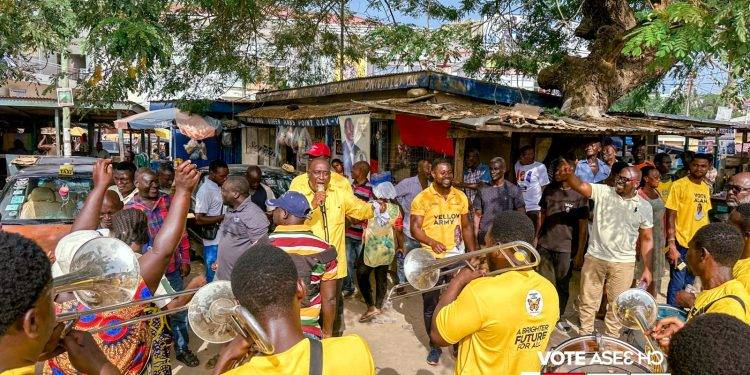Alan Kyerematen, the independent presidential candidate and leader of the Movement for Change, has made a passionate plea for Ghanaians to reject what he describes as incompetent leadership and the “destructive duopolistic system†that he believes has stunted the country’s growth.
In a recent interview with Kastle FM and during engagements with local communities in the Central Region, Alan outlined the failings of Ghana’s two dominant political parties, the National Democratic Congress (NDC) and the New Patriotic Party (NPP). According to him, both parties have had long periods in power but have failed to address key issues such as youth unemployment, economic instability, and power outages. Alan posed a critical question to Ghanaians, asking why they should continue to trust a system that simply recycles failure year after year.
“Both Mahama and Bawumia have had their time in power, and yet they have failed to bring about any meaningful transformation. They managed to push the economy into the hands of the International Monetary Fund (IMF), and we are still grappling with unreliable power supply. How long can we continue with this?†Alan questioned.
Alan’s solution to Ghana’s challenges is his Great Transformational Plan (GTP), a comprehensive strategy designed to address the country's persistent issues. He placed a strong emphasis on reviving the country’s economy, creating jobs, and fostering growth in agriculture and industry.
“We need to shift focus towards improving local production and reducing dependency on imports. The key to stabilizing our exchange rate and creating sustainable growth lies in expanding our agricultural and industrial sectors,†Alan said.
As part of his GTP, Alan pointed to the untapped potential of the Central Region, particularly in the area of cocoa farming. He emphasized that the region is rich not only in mineral resources but also in agricultural potential, and he believes that with the right investment, the region can become a driving force for Ghana's economic growth.
“Through my New Agriculture Revolution policy, we plan to invest heavily in agriculture to make it more profitable and attractive for our farmers,†Alan explained.
Alan also highlighted the critical issue of illegal mining, or galamsey, which has wreaked havoc on the environment, destroying lands and water bodies across the country. He vowed to address this issue head-on by transitioning the youth from illegal mining activities into responsible and sustainable mining practices.
“I will take away mining licenses from political appointees and make them available to the youth, enabling them to engage in proper mining activities. We can no longer allow a few greedy individuals to destroy our environment,†Alan said firmly.
In addition to his plans for agriculture and mining, Alan laid out his vision for constitutional reforms. He proposed decentralizing power, creating a second chamber of Parliament to replace the Council of State, and granting traditional authorities a more prominent role in governance.
“Our chiefs are the custodians of our lands and resources, and they must be part of the decision-making process. My government will ensure they play a central role in shaping the future of our nation,†Alan added.
He also emphasized his plans to revitalize the nation’s fishing industry, an area that has long been underdeveloped. Alan proposed empowering Ghanaians to own trawlers and establishing a Ghana National Association of Fishers to drive the growth of the sector. He emphasized that local fishers, not foreign nationals, should benefit from the country’s marine resources.
“Through investments in cold stores, fish processing plants, locally produced fishing nets, and outboard motor assembly plants, we will reduce costs, make fishing more accessible, and create wealth for local fishers,†Alan stated.
Alan also expressed his commitment to positioning the Central Region as the Tourism Hub of West Africa. He noted that the region’s rich culture, history, and natural beauty provide a unique opportunity to attract global tourists, creating jobs and boosting economic growth.
“Tourism can play a vital role in driving economic development in the Central Region. With strategic investments, we can transform the region into a world-class tourist destination,†he declared.
In his closing remarks, Alan urged Ghanaians to vote for change in the upcoming 2024 election, emphasizing that the nation’s future lies in rejecting the two-party system that has failed to deliver positive results.
“This election is not just about changing governments; it is about rejecting the destructive duopoly that has kept us in a cycle of failure for decades. With my Great Transformational Plan, we can build a prosperous, united, and self-reliant Ghana. Together, we can take control of our destiny and create a better future for all,†Alan concluded.
As Ghana heads toward the 2024 presidential elections, Alan’s call for change, along with his vision for a more inclusive and sustainable future, is likely to resonate with many Ghanaians looking for a new direction.


